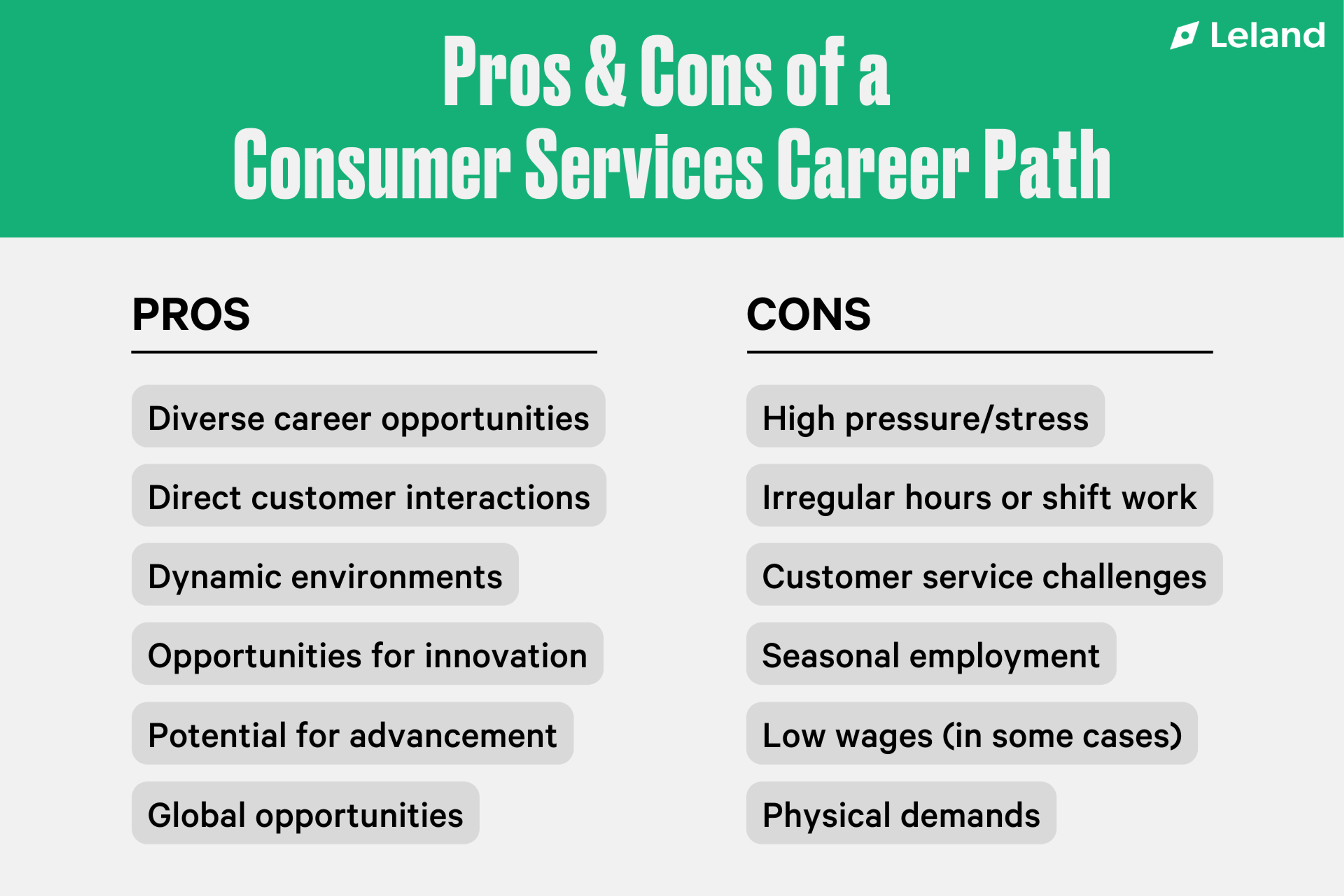Is Consumer Services a Good Career Path? Weighing the Pros and Cons in a Rapidly Growing Industry
Discover the potential of a career in consumer services with our comprehensive guide. Learn about skills required, the different options of career paths, what has led to the industry's growth, how to decide if it's the right path for you, and more.
Posted March 6, 2025

Table of Contents
Are you considering a career in the consumer services industry? With the industry growing rapidly, there are many factors to consider when deciding if it is the right career path for you. Here, we will discuss an overview of the consumer services industry, the pros and cons of pursuing a career in this field, the future of the industry, necessary skills, types of jobs, education and training, top employers, and the challenges and changes being faced in the field.
What is the Consumer Services Industry?
The consumer services industry is a broad category that encompasses a range of services that assist individuals with their daily lives. In recent years, the industry has been growing at a rapid pace due to the increasing demand for these services. Some of the service sectors underneath the umbrella of consumer services include but are not limited to:
- Retail: Businesses that sell any services directly to consumers (DTC), ranging from clothing and electronics to groceries and home goods.
- Examples: Walmart, Amazon, Costco, McDonald's
- *Note: Retail is often categorized under consumer services in broader discussions due to the nature of the interaction and the value provided to consumers, even though it primarily involves the sale of physical goods.
- Hospitality and Travel: This sector includes hotels, restaurants, travel agencies, and tourism services that cater to individuals traveling for leisure or business.
- Examples: Hilton, American Airlines, Airbnb, Uber
- Healthcare: Includes services provided by hospitals, clinics, nursing homes, and other healthcare providers that offer medical care and treatment to individuals.
- Examples: Pfizer, CVS, Babylon Health, Mindbody
- Financial Services: Consists of banks, credit unions, insurance companies, and investment firms that offer financial products and advice to consumers.
- Examples: Bank of America, Acorns
- Education: Encompasses schools, universities, tutoring, and other educational services that cater directly to students and their families.
- Examples: Leland, Chegg
- Personal Services: This can include a wide array of services such as beauty salons, fitness centers, and cleaning services that cater to the personal needs of consumers.
- Examples: Rover, Fiverr
- Entertainment and Media: Companies in this sector provide leisure and entertainment through media, movies, music, video games, and live performances.
- Examples: Comcast, Walt Disney, Netflix
- Information Technology: Although IT services can be B2B, there are also consumer-facing aspects such as tech support, software as a service (SaaS) for individuals, and consumer electronics support.
- Examples: Kasisto, IBM, Dell
- Real Estate: Involves services related to the buying, selling, renting, and leasing of residential properties for consumers.
- Examples: Zillow, Berkshire Hathaway, Redfin
The primary focus of the consumer services industry is to meet the direct needs and desires of individual consumers, providing them with valuable, often essential, services that facilitate daily living, enhance quality of life, and fulfill leisure and financial needs. The industry is characterized by its direct interaction with the end-user—i.e. the consumer—making customer service, satisfaction, and experience key factors for success in this sector.
Makeup of the Consumer Services Industry
As the above list makes clear, the consumer services industry is made up of a ton of different areas. It’s important to note as well that what is bucketed under the consumer services industry differs depending on the source, as it is such a broad category. According to Deloitte’s 2024 Consumer Products Industry Outlook report, the top 100 global consumer product companies can be divided into the following.
Top 100 Consumer Product Companies by Subsector
- Food & Beverages: 67
- Fashion & Apparel: 13
- Beauty and Personal Care: 10
- Household Products: 10
Why is Consumer Services a Growing Industry?
The consumer services industry is a growing industry for several reasons, with growth expected to continue due to various key trends and market dynamics. Some of the primary reasons for its growth include:
1. Rapid Technological Advancements
Technological innovations have transformed the consumer services industry, making it more efficient, accessible, and personalized. For instance, the rise of e-commerce has revolutionized retail, while mobile apps and online platforms have streamlined booking processes in the travel and hospitality sectors.
The impact that technology has had spans many different directions. From a high level, it has made consumers smarter and more connected. They now no longer have to rely on word-of-mouth from their communities to buy a product. They can read reviews, connect with brands through social media, and filter based on service expectations. There is also the phenomenon of the “always-on” marketplace, which is the idea that customers are expecting faster responses to their problems. 24/7 Coverage requires much more customer support and representatives.
Outside of its effects on the customer, technology has also impacted the industry as a whole as it has made new business models and solutions possible. AI will only accelerate this growth. For example, whereas you may have previously hired a neighbor or family friend to walk your dog in the past, you can now do so online comfortably with a company like Rover. Technology will continue to drive new kinds of solutions to existing problems.
2. Changing Lifestyles
Evolving lifestyles, such as the more recent increasing emphasis on convenience, health and wellness, sustainability, and experiences, influence consumer behavior and drive demand for new types of services. This can lead to the growth of sectors like meal delivery services, wellness retreats, and eco-friendly travel options. Products that may have not been desired before (or possible before, as technology changes) are now incredibly in demand. Examples of this include products that increase convenience like Doordash and new-agey healthtech like the Oura Ring and AG1. One VC has dubbed this trend, “The Huberman-ization of America.”
3. Increasing Emphasis on the Customer
One of the main predictions of AI’s effect on the business world is the increased opportunities for personalization. This will allow companies to target consumers personally and at scale. For example, retail companies can send custom product recommendations based on browsing history and other data they store.
4. Economic Trends
During periods of economic growth, consumers tend to have more disposable income, leading to increased spending on services such as dining out, entertainment, travel, and leisure activities. The exact predictions for the economy in 2024 vary, but the wealth of lower-income and middle-class households continues to grow. The growth of these segments is a very powerful indicator for consumer services – when the economy is strong, they spend more on consumer services. When base needs are filled, the need for services such as health, education, and entertainment increases.
5. Globalization
Increased interconnectedness and globalization have expanded opportunities for consumer services companies to reach new markets and demographics. This can lead to growth through international expansion and catering to diverse consumer preferences.
6. Other Factors
Two other important factors that have led to growth in the consumer services industry include pandemic effects and changes in regulatory environments. While the COVID-19 pandemic initially had a significant negative impact on many segments of the consumer services industry, it also accelerated certain trends such as the shift to online shopping, remote work, and digital entertainment. Uber is a good example of how consumer services require, and can even pre-empt, changes in consumer laws.
Consumer Services Career Paths
When you’re talking about consumer service careers, there are two things you could be referencing: (1) Consumer-facing roles at any company or (2) Any roles at companies in the consumer services industry. In the rest of this article, we’ll mostly be focusing on consumer-facing roles.
With the rise of more consumer-facing companies comes the need for more customer-facing positions. These can include anything from retail management and hospitality management to customer service, travel agencies, event planning, customer advocacy, user experience, personal services (personal trainers, estheticians, hairdressers, etc.), and much more.
Here are more specific examples of consumer services career paths.
Retail Management
- Store Manager
- Assistant Store Manager
- District Manager
- Regional Manager
- Merchandising Manager
- Retail Operations Manager
- Sales Supervisor
- Inventory Manager
- Visual Merchandiser
Hospitality Management
- Hotel Manager
- Restaurant Manager
- Food and Beverage Manager
- Event Manager
- Catering Manager
- Front Office Manager
- Guest Services Manager
- Spa Manager
- Resort Manager
Customer Service
- Customer Service Representative
- Customer Support Specialist
- Call Center Agent
- Technical Support Specialist
- Client Services Coordinator
- Customer Experience Manager
- Customer Success Manager
- Complaints Handler
Travel and Tourism
- Travel Agent
- Tour Guide
- Travel Coordinator
- Cruise Director
- Destination Specialist
- Tourism Manager
- Travel Consultant
- Airline Customer Service Representative
- Hotel Concierge
Entertainment and Recreation
- Theme Park Attendant
- Casino Dealer
- Recreation Coordinator
- Event Planner
- Theater Usher
- Museum Educator
- Sports Facility Manager
- Amusement Park Manager
- Casino Manager
Personal Services
- Hairstylist
- Massage Therapist
- Esthetician
- Personal Trainer
- Yoga Instructor
- Makeup Artist
- Nail Technician
- Pet Groomer
- Spa Therapist
Event Planning and Coordination
- Event Coordinator
- Event Planner
- Wedding Planner
- Conference Planner
- Meeting Planner
- Festival Coordinator
- Exhibition Organizer
- Venue Coordinator
- Corporate Event Manager
Fitness and Wellness
- Personal Trainer
- Fitness Instructor
- Nutritionist
- Wellness Coach
- Spa Therapist
- Yoga Instructor
- Pilates Instructor
- Massage Therapist
- Health Coach
Consumer Advocacy and Protection
- Consumer Advocate
- Consumer Rights Officer
- Consumer Affairs Specialist
- Consumer Protection Investigator
- Consumer Policy Analyst
- Consumer Law Attorney
- Ombudsman
- Consumer Education Coordinator
- Regulatory Compliance Officer
E-commerce and Digital Services
- E-commerce Manager
- Digital Marketing Specialist
- UX Designer
- Product Manager
- Data Analyst
- Online Sales Associate
- Social Media Manager
- Digital Content Creator
- SEO Specialist
Pros & Cons of Pursuing a Career in Consumer Services
As the variety of job titles within the consumer services industry demonstrates, there are many, many different types of consumer services roles. The exact benefits and drawbacks of specific roles might look slightly different but in general, here are some of them.
Pros
- Diverse Career Opportunities: The consumer services industry encompasses a wide range of sectors and roles, providing ample opportunities for individuals with different skills and interests to find fulfilling career paths.
- Direct Interaction with Customers: Many roles within the consumer services industry involve direct interaction with customers, which can be rewarding for those who enjoy helping others and building relationships.
- Dynamic and Fast-Paced Environment: The consumer services industry is often dynamic and fast-paced, offering an exciting work environment where no two days are the same. This can be appealing for individuals who thrive on variety and challenge.
- Opportunities for Creativity and Innovation: Roles within consumer services often involve finding creative solutions to meet customer needs and preferences. This can provide opportunities for innovation and personal expression.
- Potential for Advancement: With the right skills, experience, and dedication, there are often opportunities for career advancement within the consumer services industry. Many entry-level positions serve as stepping stones to higher-level roles with greater responsibility and higher pay.
- Global Opportunities: The consumer services industry operates on a global scale, providing opportunities for travel, international work experience, and exposure to diverse cultures and markets.
Cons
- High Pressure and Stress: The fast-paced nature of the consumer services industry can lead to high levels of pressure and stress, particularly during peak times or when dealing with demanding customers or tight deadlines.
- Irregular Hours and Shift Work: Many roles within consumer services, such as retail, hospitality, and event planning, may require working evenings, weekends, holidays, or irregular hours to accommodate customer needs. This can impact work-life balance and personal commitments.
- Customer Service Challenges: Dealing with difficult or unhappy customers can be challenging and emotionally draining, requiring patience, empathy, and strong communication skills.
- Seasonal Employment: Some sectors within the consumer services industry, such as tourism and retail, are highly seasonal, leading to fluctuations in demand and potential instability in employment.
- Low Wages and Job Insecurity: Entry-level positions in the consumer services industry, particularly in sectors like retail and hospitality, may offer relatively low wages and limited job security. Advancement opportunities and higher salaries often require additional education, skills, or experience.
- Physical Demands: Certain roles within consumer services, such as those in hospitality, retail, and personal services, may involve physical tasks and standing for long periods, which can be physically demanding.

The Future of Consumer Services: Job Growth & Salary Expectations
The consumer services industry has been growing at a rapid pace. As we look toward the next decade, the landscape of consumer services is poised for significant transformation, driven by some of what we’ve mentioned thus far–technological advancements, changing consumer behaviors, and evolving market demands, among others. These changes will inevitably have profound implications for job growth and salary expectations within the sector.
Job Growth
The consumer services industry as a whole is anticipated to see positive job growth. This is fueled by the increasing demand for personalized and high-quality services, the proliferation of e-commerce, and the ongoing need for healthcare services, particularly in light of an aging global population.
Technological innovation, while automating some tasks, is also creating new job opportunities. Artificial intelligence (AI) and machine learning are enabling more efficient service delivery and customer interaction, leading to the emergence of roles such as AI service managers and customer experience specialists. Furthermore, the shift towards a more digital economy is driving demand for cybersecurity experts to protect sensitive consumer information.
With the rise of e-commerce and online shopping, there is also a growing need for customer service representatives who are knowledgeable in digital platforms and can assist customers with online purchases and inquiries. These positions often come with additional benefits such as flexible work schedules and opportunities for remote work.
Salary Expectations
As job roles evolve and new positions are created, salary expectations in the consumer services industry are also set to rise, particularly for roles requiring specialized skills or technological proficiency. For instance, professionals adept at integrating AI into customer service platforms or those skilled in data analysis for enhancing customer experiences are likely to command higher salaries due to the value they bring to improving service efficiency and personalization.
As companies recognize the importance of offering competitive salaries to attract and retain top talent, especially in a tight labor market, wages across the sector are expected to see an upward trend. This is particularly true for roles that directly impact customer satisfaction and loyalty, which are critical determinants of a company's success in the consumer services industry.
However, it's important to note that salary growth may vary significantly across different segments of the industry and geographical regions, influenced by factors such as local economic conditions, the cost of living, and regulatory environments.
Skills Required for a Successful Career in Consumer Services
There are many skills required to be successful in consumer services. Exceptional communication skills and the ability to empathize with customers are at the top of the list. You must also have excellent attention to detail, be able to manage your workload effectively, and be comfortable working with various technological tools and platforms that the companies use.
Another important skill for a successful career in consumer services is problem-solving. You will encounter a variety of customer issues and complaints, and it is your responsibility to find a solution that satisfies both the customer and the company. Additionally, having a positive attitude and the ability to remain calm under pressure is crucial in this field. Customers can become frustrated or upset, and it is important to handle these situations with professionalism and empathy.
Finally, staying up-to-date with industry trends and changes is essential for success in consumer services. This includes understanding new technologies, products, and services that your company may offer, as well as keeping an eye on competitors and market trends. By staying informed, you can provide better service to customers and make informed decisions that benefit both the customer and the company.
To recap, among the many skills required for the consumer services include, some of the major ones include the following. These are more broad; depending on the specific subsection/role, the skills required might be slightly different.
- Exceptional communication
- Ability to empathize with customers
- Attention to detail
- Time and workload management
- Technological proficiency
- Problem-solving
- Positive attitude and ability to remain calm under pressure
- Staying up-to-date on industry trends
Is a Career in Consumer Services Right for You?
Deciding on a career path is a significant decision that involves assessing your interests, skills, and the potential for personal and professional growth. The consumer services sector, with its diverse range of industries and roles, offers a plethora of opportunities for those passionate about making a positive impact in people's lives. However, it's essential to consider several factors to determine if this dynamic sector aligns with your career aspirations and lifestyle preferences.
Here are some questions we recommend asking yourself:
1. Do you have a passion for service?
At the heart of the consumer services sector is a commitment to serving others. Whether you're interested in hospitality, retail, healthcare, or financial services, a genuine desire to help and engage with people is crucial. If you find satisfaction in solving problems, improving customer experiences, or contributing to someone's well-being, consumer services could be a fulfilling career choice for you.
2. Are you adaptable, and do you like to learn?
The consumer services industry is characterized by rapid changes in technology, consumer behavior, and regulatory environments. Professionals in this sector must be adaptable, ready to embrace new challenges, and continuously update their skills. If you're someone who thrives in a dynamic environment and is always eager to learn new things, this sector can offer you an engaging career path that never gets stagnant.
3. Are you an effective communicator?
Effective communication and strong interpersonal skills are the linchpins of success in consumer services. The ability to listen to, empathize with, and resolve customers' issues is fundamental. If you have a knack for connecting with people, building relationships, and communicating effectively in various situations, you will likely find a rewarding career in consumer services.
4. Are you resilient and do you have good stress management?
Jobs in consumer services can sometimes be high-pressure, especially in roles that involve dealing with unhappy customers or meeting tight deadlines. Resilience and the ability to manage stress effectively are important traits for thriving in this sector. If you can stay calm under pressure, handle criticism constructively, and bounce back from setbacks, you'll be well-suited to the challenges and rewards of a consumer services career.
5. How important is having flexible working hours to you?
Many consumer services roles, particularly in retail, hospitality, and healthcare, require flexibility in working hours, including evenings, weekends, and holidays. If you prefer a job with a regular nine-to-five schedule, this sector might not align with your lifestyle. However, if you value flexibility and are open to unconventional working hours, the consumer services sector offers many opportunities.
Talk to an Expert
To make an informed decision about whether the consumer services sector is right for you, consider seeking informational interviews with professionals already working in the field. Additionally, internships and part-time jobs can provide hands-on experience and a clearer understanding of what to expect. We highly recommend talking to a career coach to discuss your background, skills, and goals and making a plan for success. Below are some of our most popular career coaches, browse all of them here.
Read these next:
- An Expert’s Guide to Resumes: Five Tips to Make You Stand Out
- How to Negotiate Your Salary – With Example Emails
- To Be a Jack of All Trades or Master of One?
FAQs
What is consumer services?
- Consumer services refer to the economic sector focused on providing services to individuals as opposed to producing goods. This broad sector includes industries such as retail, hospitality, finance, healthcare, and more, offering a wide range of career opportunities aimed at enhancing customer satisfaction and improving service delivery.
Why should I choose a career in consumer services?
- Choosing a career in consumer services can be rewarding for individuals passionate about helping others and making a positive impact on their lives. This sector offers diverse job opportunities, the potential for personal and professional growth, and the chance to work in a dynamic and evolving industry. See the article for a more in-depth response.
Are there good career prospects in consumer services?
- Yes, the consumer services sector is expected to see significant job growth, particularly in areas influenced by technological advancements, an aging population, and an increasing focus on personalized customer experiences. Roles in digital marketing, AI integration, customer service management, and sustainability initiatives are among the areas with promising career prospects.
What skills are needed for a successful career in consumer services?
- Successful careers in consumer services require a combination of soft and technical skills. Essential skills include strong communication and interpersonal abilities, problem-solving, adaptability, customer service orientation, and a proficiency in relevant technologies. Continuous learning and development are also crucial in this rapidly changing sector.
How can I start a career in consumer services?
- Starting a career in consumer services often begins with obtaining relevant education and training, such as degrees or certifications in business, hospitality, finance, or other related fields. Gaining experience through internships, part-time jobs, or volunteer work in service-oriented roles can also provide a solid foundation. Networking and leveraging social media platforms for professional connections are valuable strategies for entering this sector.
What are the challenges of working in consumer services?
- Working in consumer services can present challenges such as dealing with difficult customers, managing high-stress situations, and adapting to irregular working hours. However, these challenges also offer opportunities for personal growth and developing valuable life skills, such as resilience and stress management.
Is consumer services a flexible career path?
- Yes, the consumer services sector offers flexibility in terms of job roles, career progression, and working hours. Many positions provide opportunities for part-time work, remote work, and unconventional schedules, catering to individuals seeking work-life balance.
How do salaries in consumer services compare to other industries?
- Salaries in the consumer services sector vary widely depending on the industry, role, and level of experience. While some entry-level positions may offer lower starting salaries, there is significant potential for salary growth, especially in specialized or managerial roles that require specific skills and experience.


















